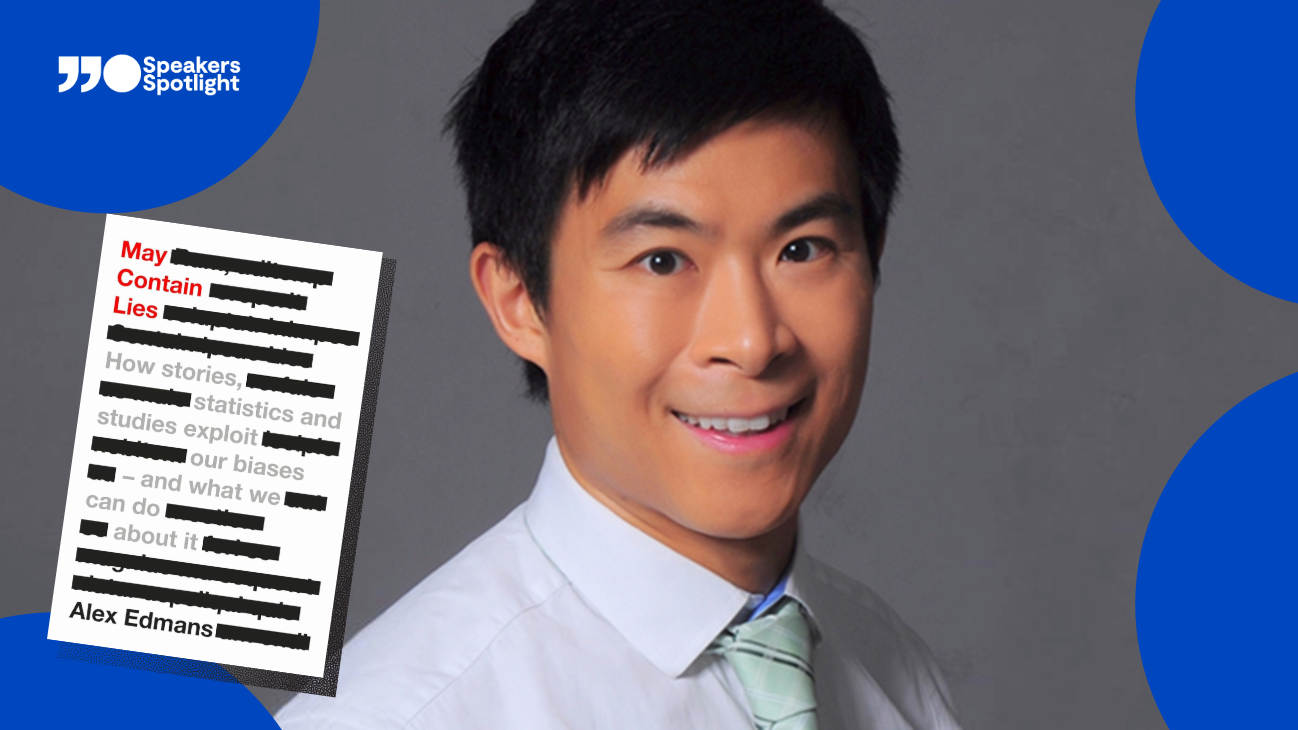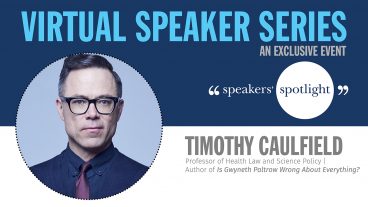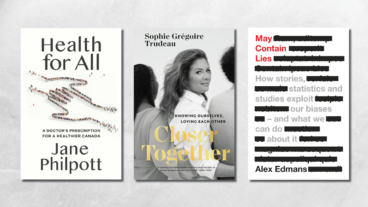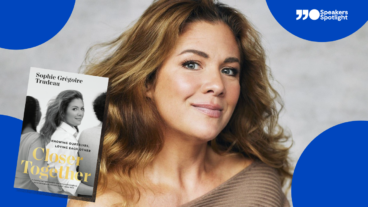Named one of May’s 2024 Must-Read Books by the Next Big Idea Club — a book club curated by bestselling authors Malcolm Gladwell, Adam Grant, Susan Cain, and Daniel Pink — Alex Edman’s new book May Contain Lies tackles misinformation: why we fall for it and how to combat it.
Alex is an esteemed professor of finance at the London Business School and the bestselling author of Grow the Pie: How Great Companies Deliver Both Purpose and Profit. Building on his popular TED Talk “What to Trust in a Post-Truth World”, which has over 2 million views, his second book is already an Amazon #1 category bestseller and has been named one of Financial Times’ “Business Books of the Month”.
Below, Alex takes us on a deep dive into his new book, exploring the four missteps that feed misinformation and how to better arm ourselves against it.
Facts, Data, and Evidence: Knowing What to Trust
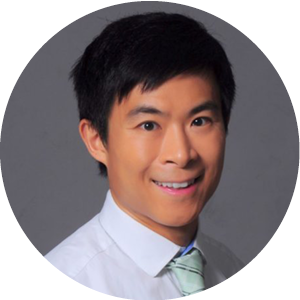
Our lives are minefields of misinformation. It ripples through our social media feeds, our daily headlines, and the pronouncements of politicians, business leaders, and bestselling authors. Stories, statistics, and studies are everywhere, allowing people to find evidence to support whatever position they want. Many of these sources are flawed, yet by playing on our emotions and preying on our biases, they can gain widespread acceptance, warp our views, and distort our decisions.
I wrote my new book, May Contain Lies, to help people separate fact from fiction. There are already several good books on misinformation, but they typically list hundreds of ways in which people can deceive us; it’s hard to remember each one and put this knowledge into practice. My book introduces the “Ladder of Misinference”, which categorizes misinformation into four missteps:
- A statement is not fact: it may not be accurate. Now we already know to check the facts, and many fact-checking websites now exist. But the punchline of the book is that checking the facts is not enough. Even if the facts are 100% accurate, they may still be misleading due to the other three steps.
- A fact is not data: it may not be representative if it’s selectively quoted. Apple is highly successful, and perhaps Apple did “start with why”. But there could be tons of other companies who started with why and failed, so a single anecdote doesn’t mean it’s the secret to access.
- Data is not evidence: it may not be conclusive if it’s correlation without causation. People who eat whole grains are less likely to have heart disease. But people who choose to eat whole grains may lead healthier lives in general, and this could be causing the lower heart disease, rather than whole grains being a superfood.
- Evidence is not proof: it may not be universal if it’s in a different context. The Marshmallow Studies showed that kids who resist eating a marshmallow (to get two later) do better in life. But they focused on Stanford University children. Kids of less wealthy backgrounds may be better off eating whatever’s in front of them, since it may not be there tomorrow.
How to Think Smart, Sharper, and More Critically
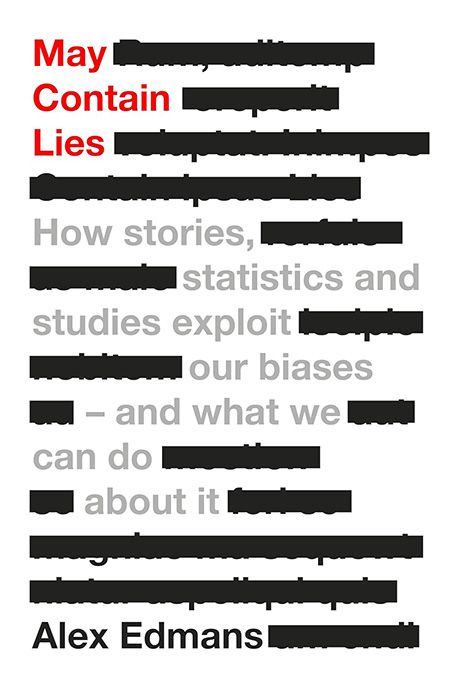
I got into this topic through my day job as a business school professor, encountering flimsy case studies, articles, and books about business. But misinformation is everywhere, and not limited to business — the themes of this book include politics, science, health advice, personal development, and even parenting.
As Managing Editor of a leading academic journal for six years, I had to evaluate research and decide which papers to accept and reject. But we’re all affected by research even if we never read a single academic paper. Each time we pick up a self-help book, browse through the latest Men’s Fitness, Women’s Health, or Runner’s World, or open an article shared on LinkedIn, we’re reading about research. Whenever we listen to an expert’s opinion on whether to invest in crypto, how to teach our kids to read, or why inflation is so high, we’re hearing about research. And information is far broader than research — our news feeds are bombarded not only with “New study finds that …” but also anecdotes like “How daily journaling boosted my mental health”, hunches such as “Five tips to ace your job interview”, and speculation like “Why we’ll colonize Mars by 2050.”
Regardless of the topic, and regardless of the information source, this book aims to help you think smarter, sharper, and more critically, to make better sense of the world and take better decisions. Here’s how:
- Part 1: Sun Tzu’s The Art of War says how you should “know your enemy” before drawing up battle plans. So, the book starts by learning about our enemy — biases. I take a deep dive into the two psychological biases — confirmation bias and black-and-white thinking — that are the two biggest culprits in causing us to misinterpret information.
- Part 2: I study the effects of these biases — the problems. I walk through each step of the Ladder of Misinference and share a practical guide to help people discern whether a statement really is fact, a fact truly is data, data genuinely is evidence, and evidence actually is proof.
- Part 3: I go beyond the ladder to look at the solutions, which moves past evaluating facts, data, and evidence to think critically more generally. This goes beyond the individual, but also looks at creating smart-thinking organizations that can harness diversity of thought, overcome groupthink, and embrace challenge.
The word “lie” typically means an outright falsehood. But “lie” is simply the opposite of “truth”. Someone can lie by hiding contradictory information, not gathering it in the first place, or drawing invalid conclusions from valid data. Even if books, studies, or talks are filled with facts, they should all carry the same health warning — they may contain lies.
An expert in purposeful business, ESGs, behavioural economics, and the use and misuse of data, Alex Edmans is in-demand for his ability to present complex content in an approachable and engaging manner.
Contact us to learn more about Alex and how you can book him for your next event.

